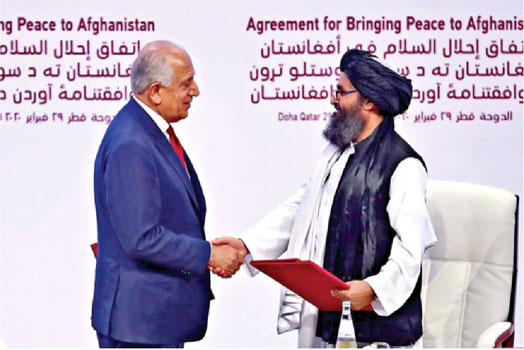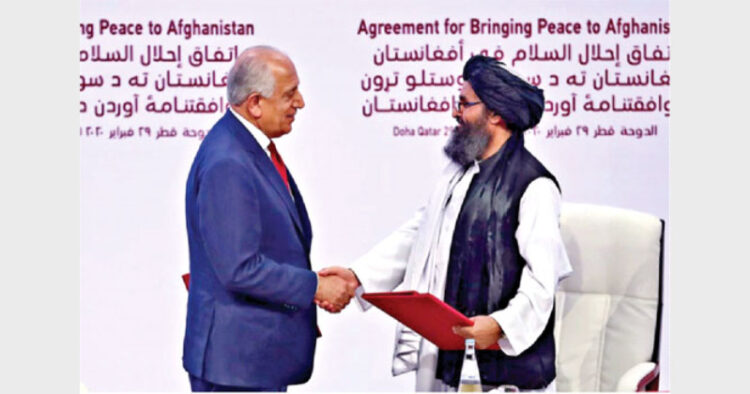
U.S. envoy Zalmay Khalilzad and Taliban leader
Mullah Abdul Ghani Baradar signing the peace deal in Doha, Qatar
Mullah Abdul Ghani Baradar signing the peace deal in Doha, Qatar
New Delhi just has to be more watchful and chalk out a new strategy at an appropriate time but now it’s best to observe the developments and let things unfold
Manish Rai
United States and Taliban have entered into an agreement in Qatari capital Doha which will pave way for US forces to leave war torn Afghanistan. Under the Doha agreement, the US has committed to reduce its force level to 8,600 from 13,000 soldiers in the next three to four months, with the remaining forces withdrawing over the next 14 months. In return Taliban has committed to ensure that Afghan soil is not used to plot attacks on the United States or its allies. But this agreement has already raised temperature in New Delhi as many experts and analysts are anxious that the Taliban’s return to power may jeopardise India’s $3 billion worth of investments and strategic interests. Moreover, with Taliban return to power influence of Pakistan will drastically increase which will be a nightmare for Indian geopolitical interests in the region. But a wait and watch approach will be the most appropriate for India to pursue at this point in time. As a lot has been changed in Afghan political landscape since 2001. Islamabad has long sought a subdued government in Kabul to push its strategic depth policy as we witness this when Taliban was ruling Afghanistan from 1996 to 2001. That time Taliban was a rag tag militia with no strategic thinking hence was playing in the hand of Pakistani deep state. But today’s Taliban are shrewd politicians it won’t be a cake walk for Pakistan to use them at will.
India was never averse to Kabul reconciling with the Taliban as far as New Delhi is concerned. The Taliban is not the central problem. Pakistan’s overwhelming influence on the Taliban and the latter’s inability to liberate itself from such influence is the main issue. As the Taliban is not a regional player, they don’t aim to be like the Al Qaeda or the ISIS to launch global jihad. Taliban insurgency in the last 18 years has been focused only on Afghanistan but that doesn’t mean that the Taliban will make good friends of India.
I interviewed Wakeel Ahmad Muttawakil, Taliban’s Ex-Foreign minister and a close confidant of Mulla Omar in 2014, while on an assignment in Afghanistan. Muttawakil told me that the Taliban has changed as they now have a more mature political thinking. He also said that it was a mistake on India’s part that it didn’t recognise Taliban’s regime in 1996 and also didn’t open any channel of communication with them. But now New Delhi understands it clearly that Taliban can’t be totally ignored under any circumstances as they will be a significant player in Afghanistan. Taliban also realises that India has played a major constructive role in Afghanistan. India is playing a significant developmental role in Afghanistan as one of the largest bilateral donors. Since the fall of the Taliban, India has strengthened Afghan trade ties and provided more than $3 billion in reconstruction assistance.
It’s a hard truth that as its principal sponsor, Pakistan has considerable influence over the Taliban. But India has what Pakistan does not have the economic clout to assist or help Afghanistan. Economic aid never fails to produce influence. New Delhi aid must not only continue but also increase with firm commitments over the next decade. For India amount like $1 billion a year is a small price to pay for establishing its influence in Afghanistan. Taliban leaders know very well that Pakistan itself is in deep economic crisis and that it simply doesn’t have muscles to provide any assistance. Also Pakistan wants Afghanistan to be its vassal. Taliban will definitely look for sovereignty and economic independence from Pakistan once they get politically settled. At that time India will be a very viable option. Indian policy makers should pay adequate attention to a strategy to make the Afghan Taliban relatively independent of Pakistan.
So, there is nothing to panic for India. But definitely India has to be very cautious and plan its move well in advance. In addition to this, India will not only be left with just one option of establishing communication with Taliban. There are a number of other options too. If Taliban is not responding, then India can increase its support to non-Pashtun groups which are fiercely opposed to the Taliban. India’s has its old friends in the north – the Tajiks, Hazaras and Uzbeks, whom it has always supported. Back in 1996 till 2001 when non-Pashtun ethnic groups were united under the banner of Northern Alliance and led by legendary Tajik commander Ahmad Shah Masood. India was backing this united front against Taliban and provided key material support from its Farkhor base in Tajikistan. It should be noted that this agreement in Doha is not a peace deal. It’s just a managed US exit from Afghanistan. It won’t be possible for Taliban to take over the whole country without striking an intra Afghan peace deal for some sort of power sharing between different ethnicities of Afghan society. Hence, it will be wrong to jump to the conclusion that India cannot do much in Afghanistan and it’s time for India to pack their bags and leave. New Delhi just has to be more watchful and chalk out a new strategy at an appropriate time but now it’s best to observe the developments and let things unfold.
(The writer is a columnist for West-Asia and Af-Pak region and Editor of geo-political news agency ViewsAround can be reached at manishraiva@gmail.com)













Comments